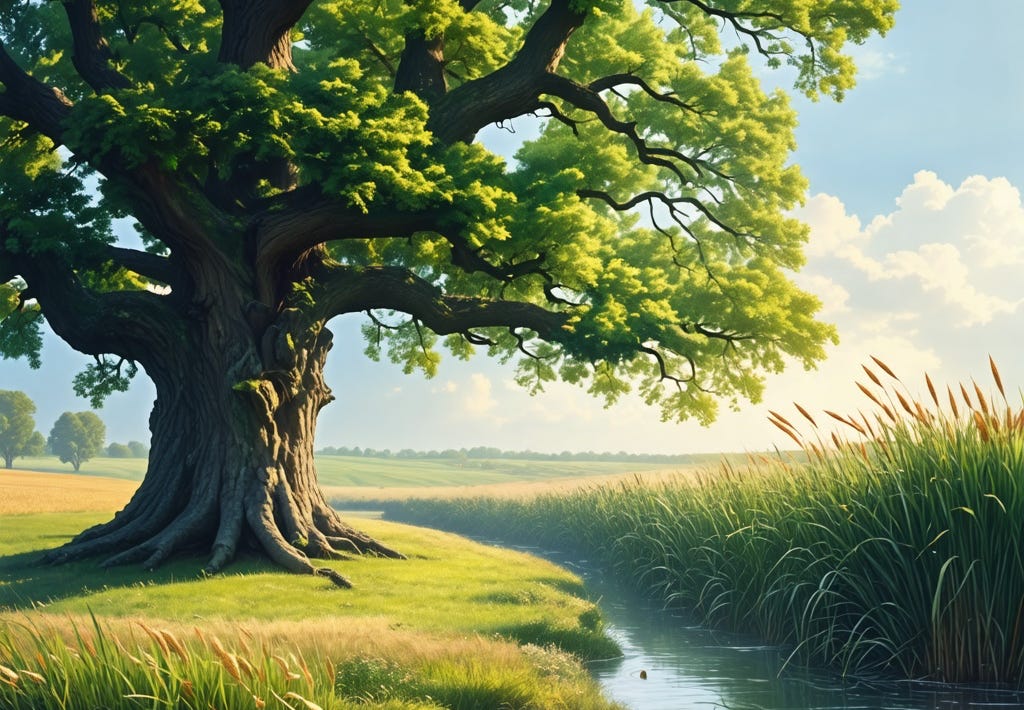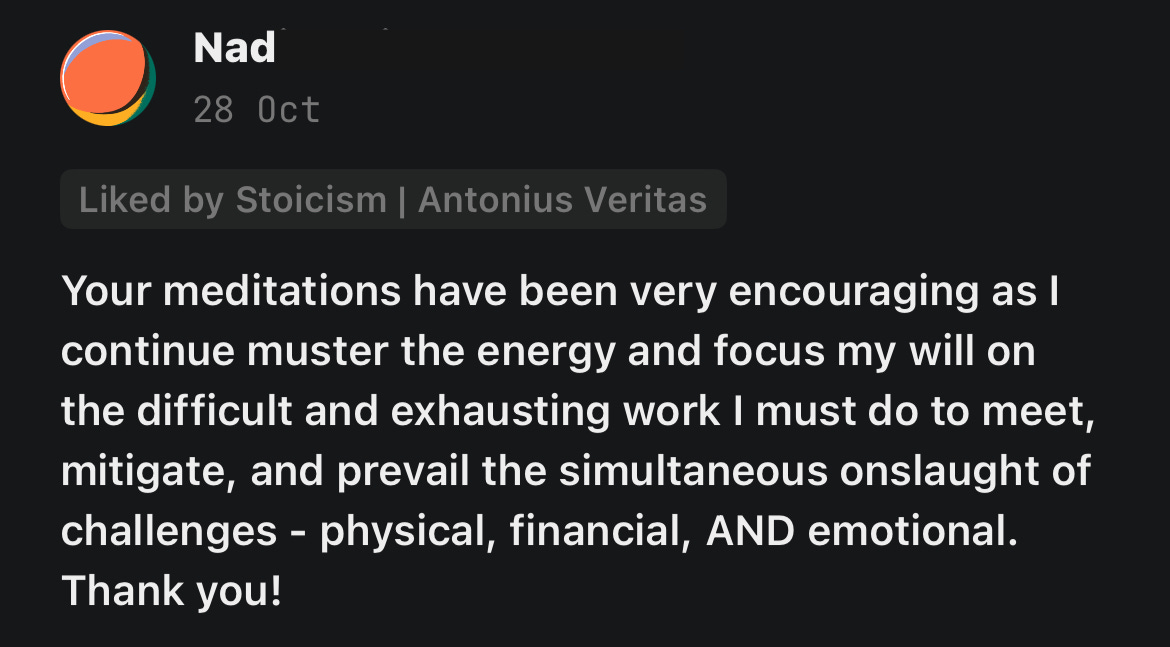XXXIX. Strength Equals Ease
It's satisfying to see what we can do to influence our well-being and the world around us with the powers we’ve acquired through practice.
“You have power over your mind, not outside events. Realize this, and you will find strength.” — Marcus Aurelius
Below is a story about The Oak & the Reed as adapted from Aesop’s Fables,
A Giant Oak stood near a brook in which grew some slender Reeds.
When the wind blew, the great Oak stood proudly upright with its hundred arms uplifted to the sky.
But the Reeds bowed low in the wind and sang a sad and mournful song.
"You have reason to complain," said the Oak.
"The slightest breeze that ruffles the surface of the water makes you bow your heads, while I, the mighty Oak, stand upright and firm before the howling tempest."
"Do not worry about us," replied the Reeds.
"The winds do not harm us. We bow before them and so we do not break. You, in all your pride and strength, have so far resisted their blows. But the end is coming."
As the Reeds spoke a great hurricane rushed out of the north.
The Oak stood proudly and fought against the storm, while the yielding Reeds bowed low.
The wind redoubled in fury, and all at once the great tree fell, torn up by the roots, and lay among the pitying Reeds.
Being strong is fun.
It's satisfying to see what we can do to influence our well-being and the world around us with the powers we’ve acquired through practice.
We feel good to see people frustrated because they can't control us.
They can’t say anything to baffle or destabilize us because we own our insecurities.
We feel great knowing a tragic situation could have broken anyone else but, paradoxically, it made us better — we saw it as an opportunity to exercise our divine strength.
“I hear you say, ‘How unlucky that this should happen to me!’
Not at all! Say instead, ‘How lucky that I am not broken by what has happened and am not afraid of what is about to happen.
The same blow might have struck anyone, but not many would have absorbed it without capitulation or complaint.’ — Marcus Aurelius
No feeling beats the creation of beautiful and impactful art, solving complex problems, performing our craft with uncanny excellence.
There's immense gratification in progressively increasing the weight we can carry in the gym, the distance we can run without losing our breath, the weight we’ve lost in the quest to become healthy — after reflecting on our former feeble bodies.
It feels great to exude a confident and dominant aura without saying a word.
We feel secure in tumultuous economic times knowing we can buy anything we want, go wherever we please, have fun, and take care of those around us without worrying about where the next check will come from.
“It is not the man who has too little, but the man who craves more, that is poor.” — Seneca
It feels great to look at the power we get from a reputation for good leadership, strength, and competence such that wherever we go people admire, listen, compete for our attention and we get good recompense.
“The supreme art of war is to subdue the enemy without fighting.” — Sun Tzu
That’s why we can’t settle for less.
We’re worthy of that lifestyle to enhance the quality of our human experience.
It’s therefore wise to get stronger in all areas of our lives: finances, relationships, craft, art, sex, soul, mind, physical health and prowess, character & leadership, and self-defense.
If not, we risk facing the same fate as the donkey in the following fable called The Animals & the Plague.
The Animals & the Plague
Once upon a time a severe plague raged among the animals.
Many died, and those who lived were so ill, that they cared for neither food nor drink, and dragged themselves about listlessly.
No longer could a fat young hen tempt Master Fox to dinner, nor a tender lamb rouse greedy Sir Wolf's appetite.
At last the Lion decided to call a council.
When all the animals were gathered together he arose and said:
"Dear friends, I believe the gods have sent this plague upon us as a punishment for our sins. Therefore, the most guilty one of us must be offered in sacrifice. Perhaps we may thus obtain forgiveness and cure for all.
"I will confess all my sins first. I admit that I have been very greedy and have devoured many sheep. They had done me no harm. I have eaten goats and bulls and stags. To tell the truth, I even ate up a shepherd now and then.
"Now, if I am the most guilty, I am ready to be sacrificed. But I think it best that each one confess his sins as I have done. Then we can decide in all justice who is the most guilty."
"Your majesty," said the Fox, "you are too good. Can it be a crime to eat sheep, such stupid mutton heads? No, no, your majesty. You have done them great honor by eating them up.”
"And so far as shepherds are concerned, we all know they belong to that puny race that pretends to be our masters."
All the animals applauded the Fox loudly.
Then, though the Tiger, the Bear, the Wolf, and all the savage beasts recited the most wicked deeds, all were excused and made to appear very saint-like and innocent.
It was now the Ass's turn to confess.
"I remember," he said guiltily, "that one day as I was passing a field belonging to some priests, I was so tempted by the tender grass and my hunger, that I could not resist nibbling a bit of it. I had no right to do it, I admit—"
A great uproar among the beasts interrupted him.
Here was the culprit who had brought misfortune on all of them!
What a horrible crime it was to eat grass that belonged to someone else! It was enough to hang anyone for, much more an Ass.
Immediately they all fell upon him, the Wolf in the lead, and soon had made an end to him, sacrificing him to the gods then and there, and without the formality of an altar.
The greatest peril of weakness is that we become fodder for those up the food chain.
And we can’t play victim or feel sorry for ourselves — that’s pathetic.
We have to be strategic, crafty, wise, and cunning enough to survive like the fox does in that story.
We can embody the virtues of our enemies, what helps them become powerful, without becoming like them.
Like Rome becoming keener and more intolerant to weakness because of Hannibal’s attacks, we can use our foes to make us the shiny diamonds we were destined to be.
This doesn’t happen by being nice, like the donkey or the sheep in our story.
It may involve playing some unorthodox political maneuvers — as long as we don’t hurt other people.
We must study psychology and weaponize it for greater aims because as Stoics, we’re Nietzche’s Higher men.
That’s why I wrote the essay 'on power’ and how to acquire it.
We channel our aggressive energy, rage, envy, and other demons inherent to humanity, into our work so we can become indispensable, in our spirit so we can fight for ourselves — our cause, and into changing the environment around us to ensure it everyone flourishes.
However, it’s good to realize strength is subtle.
It doesn’t announce itself yet it’s felt.
Forcing it on anyone and obnoxiously saying we’re strong is repulsive; people must follow us because they think it’s in their best interest to do so.
It must take on the moral lesson of this story called The North Wind & the Sun if we’re to have fun with it.
If we’re to survive the great hurricanes in our lives, like the Reeds.
The story goes as follows,







